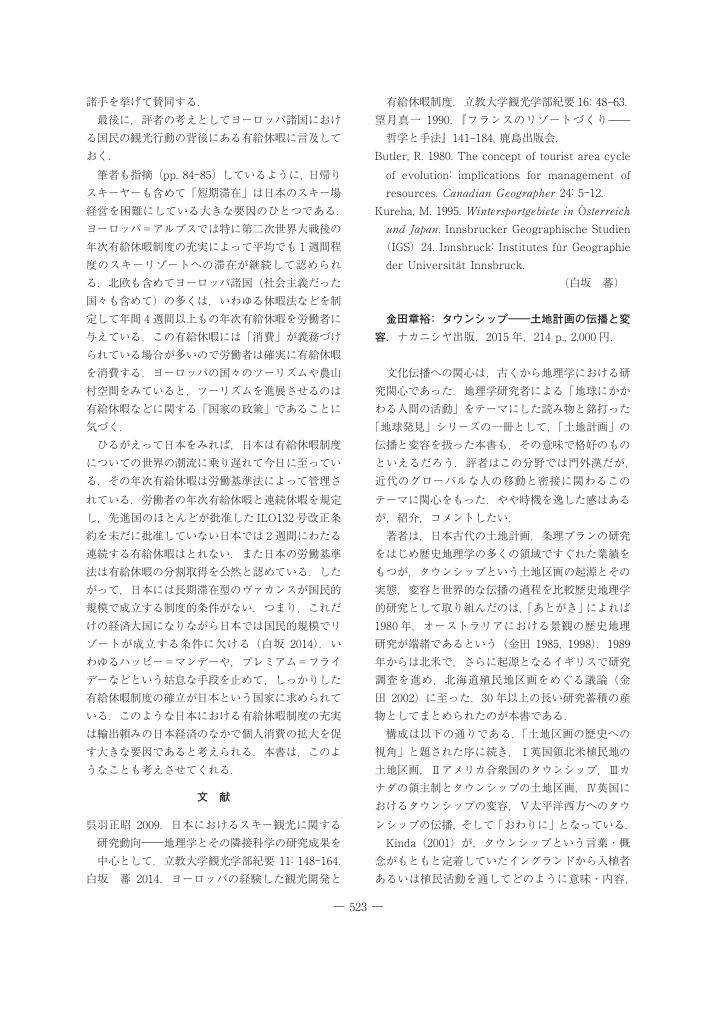15 0 0 0 OA II 戦後復興と地理学の展開
3 0 0 0 OA 選挙地理研究の課題と動向
- 著者
- 千葉 立也
- 出版者
- The Association of Japanese Geographers
- 雑誌
- 地理学評論 (ISSN:00167444)
- 巻号頁・発行日
- vol.51, no.3, pp.235-244, 1978-03-01 (Released:2008-12-24)
- 参考文献数
- 41
- 被引用文献数
- 2
Electoral geography, which deals, for the most part, with the regional variations in voting behavior, has occupied one of the main field of the study on the political behavior or on the opinion. Some new ways of research have been introduced in this field and these are summarised here in reference to main and important articles of electoral geography. 1) One of the traditional view points represented by Siegfried is that the political opinion is concerned much more with the social integration of the community through the activities and influences of the social, political and economic organizations or groups. Without this point of view, quantification of each socio-economic element would not be able to clarify the complex relations between community and opinion of its residents. 2) On the other hand, the behavioral approach, represented by Cox, considers spatial elements which are important in the behavior and decision and gives its own explanation in the field of geographical studies to the modeling of voting behavior within the spatial context. But many problems remain to be solved; measuring of the network structure, the information flow and the attitude changed by the acceptance of information, tempo-spatial generalization from the results of small-scale sampling survey to large-scale voting characteristics and so on. 3) Kasperson and McPhail, for example, have recently written some interesting articles which show one of the recent trends in this field. This is the dynamic analysis of areal differentiation in voting behavior and its influence upon the political system through the electoral results. These new points of view in electoral geography within the field of political geography should introduce more of the works done in the recent accomplish ments in social geography so as to elaborate the analysis of spatial pattern in voting behavior.
1 0 0 0 OA 金田章裕: タウンシップ――土地計画の伝播と変容
- 著者
- 千葉 立也
- 出版者
- 公益社団法人 日本地理学会
- 雑誌
- 地理学評論 Series A (ISSN:18834388)
- 巻号頁・発行日
- vol.90, no.5, pp.523-526, 2017 (Released:2022-03-02)
- 参考文献数
- 4
1 0 0 0 OA 杉浦 直:エスニック地理学
- 著者
- 千葉 立也
- 出版者
- 公益社団法人 日本地理学会
- 雑誌
- 地理学評論 Series A (ISSN:18834388)
- 巻号頁・発行日
- vol.84, no.5, pp.500-502, 2011-09-01 (Released:2015-10-15)
- 参考文献数
- 2
1 0 0 0 OA 石井素介: 国土保全の思想
- 著者
- 千葉 立也
- 出版者
- The Association of Japanese Geographers
- 雑誌
- 地理学評論 (ISSN:13479555)
- 巻号頁・発行日
- vol.81, no.7, pp.608-610, 2008-09-01 (Released:2010-03-12)
- 参考文献数
- 3
- 被引用文献数
- 1
1 0 0 0 地方銀行の県外店舗網の展開と資金移動
- 著者
- 千葉 立也
- 出版者
- 経済地理学会
- 雑誌
- 経済地理学年報 (ISSN:00045683)
- 巻号頁・発行日
- vol.26, no.4, pp.257-269, 1981-02-28
1 0 0 0 OA 現代日本の人口減少問題に対する外国人定住化の貢献に関する研究
- 著者
- 石川 義孝 宮澤 仁 竹ノ下 弘久 中谷 友樹 西原 純 千葉 立也 神谷 浩夫 杜 国慶 山本 健兒 高畑 幸 竹下 修子 片岡 博美 花岡 和聖 是川 夕
- 出版者
- 京都大学
- 雑誌
- 基盤研究(A)
- 巻号頁・発行日
- 2009
わが国在住の外国人による人口減少国日本への具体的貢献の方法や程度は、彼らの国籍、在留資格などに応じて多様であるうえ、国内での地域差も大きい。しかも、外国人は多岐にわたる職業に従事しており、現代日本に対する彼らの貢献は必ずしも顕著とは言えない。また、外国人女性や国際結婚カップル女性による出生率は、日本人女性の出生率と同程度か、より低い水準にある。一部の地方自治体による地道な支援施策が注目される一方、国による社会統合策は不十分であり前進が望まれる。



